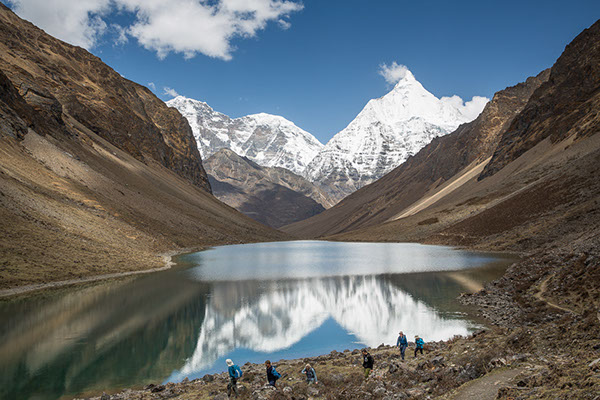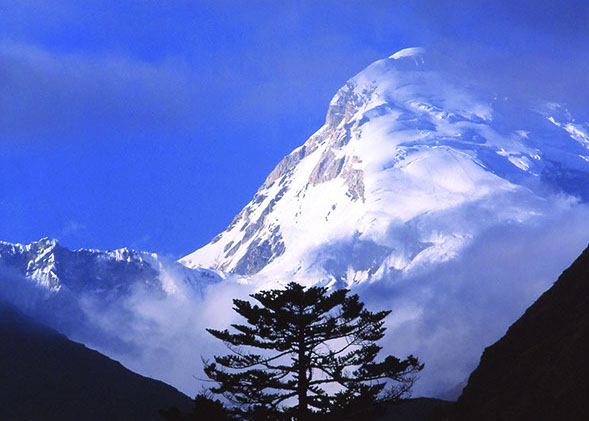LODAY ZANGPHEL TOURS & TREKS
LODAY ZANGPHEL TOURS & TREKS



Jomolhari Trek
Itinerary
Useful Info
Day 1: Arrive Paro
On the air-journey to Paro, you can lavish the magnificent and breathtaking view of the towering Mount Everest and other famous Himalayan snow-capped peaks. On arrival at Paro airport, you will be met by our representative and transferred to the hotel after completion of arrival formalities. Evening visit to Paro market and town. Overnight at the hotel in Paro.
Day 2: Paro
Begin this day with a short drive to the ruined fortress of Drugyel dzong which still attracts visitors due to the strategic location of the fort. From this fort Bhutanese repelled several invasions by Tibetan armies. Nearby visit traditional Bhutanese Farm House which offers good insight into lifestyle of local people. Then take an excursion to Taktsang Monastery, the spot where Guru Rinpoche arrived on the back of a tigress and meditated. The temple is perched on a sheer rock face. The excursion to monastery’s view point takes about 5 hours for round trip. While return to Paro town visit enroute Kyichu Lhakhang, one of the oldest and most sacred shrines of the Kingdom. In the evening visit local market and overnight at the hotel in Paro.
Day 3: Paro – Shana, 17km, 5-6 hours
Our trek to Shana starts at Drukgyal Dzong. At first you have to walk down to the level of the Paro river, the path runs on the left (western) side of the river. The trail then climbs gently through well-maintained rice terraces and fields of millet. Later on we come to apple orchards and forests. Soon the valley widens, and we reach the army post of Gunitsawa (2,810m). This is the last stop before Tibet. We continue upwards to just beyond Sharma Zampa (2,870m), where there are several good camping places in meadows surrounded by trees.
Day 4: Shana – Soi Thangthangkha, 20km, 7-8 hours
Continue uphill through the river valley. It narrows and closes in and the trail winds up and down along the drainage. After crossing a bridge to the left bank of the river, we stop for a hot lunch. Then we continue along the river, climbing upwards through rhododendron forests, and crossing the river once more before reaching our campsite (3,750m).
Day 5: Soi Thangthangkha – Jangothang, 19km, 7-8 hours
The path ascends for a while until we reach the army camp. We then follow the river above the tree line, enjoying stunning views of the surrounding peaks. Lunch will probably be at one of these camps beneath a ruined fortress at the base of Chomolhari. A short walk from here into the valley takes us to our campsite at Jangothang (4,040 m). From here, the views of Chomolhari and Jichu Drake are superb.
Day 6: Jangothang – Lingshi, 18km, 7-8 hours
The trail follows the stream for half an hour and crosses the bridge to the right side. Start the ascent up to the first ridge with a breathtaking view of Mount. Chomolhari, Jichu Drake and Tsrim Khang. Then walk towards the valley, almost flat for a while, until the climb to the Nyele la pass at an altitude of 4,700m. After the pass, it’s a gradual descent to the Lingshi camp, enjoying the panormic view of the peaks and Lingshi Dzong. Campsite at altitude of 4,000m.
Day 7: Lingshi – Shodu, 22km, 8-9 hours
Our trail climbs up towards a small white chorten on a ridge above the camp, then turns south up the deep Mo Chu valley. The trail stays on the west side of this largely treeless valley, climbing steadily a short distance above the Mo Chu. It then crosses the river, and climbs steeply for two hours to Yeli-la (4,820m). On a clear day you can see Chomolhari, Gangchenta, Tserimgang and Masagang from this pass. Descend alongside a stream to a rock shelter in the cliff face, and then continue on downstream till reaching Shodu (4,100m), where we will camp in a meadow with a chorten in it.
Day 8: Shodu – Barshong, 16km, 6/-7 hours
Today’s trail winds up & down following the Thimphu Chhu and follow the river through the limestone valley. Monks use the caves in the rocks and even Zhabdrung is said to have mediated in these rocks when he fleed from Tibet in the 17th century. There are stunning views of rocky cliff faces and waterfalls along the way. We stop at the riverside for a hot lunch. Then the trail takes us gradually upwards to the ruins of Barshong Dzong (3,600m), near which we camp for the night.
Day 9: Barshong – Dolam Kencho, 15km, 5-6 hours
The trail descends gently through a dense forest of rhododendron, birch and conifers, then drops steeply to meet the Thimphu Chu. The trail runs along the left bank of the river, climbing over ridges and descending into gullies where side streams run down into the river. The final stage of the trail climbs around a cliff face high above the Thimphu Chu, coming out onto pastureland where we camp for the night at 3,600m.
Day 10: Dolam Kencho – Dodena – Thimphu, 8km, 3 hours
Today is an easy walk. The trail winds in and out of side valleys above the Thimphu Chu, making a long ascent through a forest of conifers and high altitude broadleaf species to a pass at 3,510m. The trail then drops steeply down to the river, following it southward to the road head at Dodena (2,600m). Our transport meets us here, and we drive to Thimphu. Overnight at hotel in Thimphu.
Day 11: Thimphu – Paro
After breakfast visit Trashichhodzong, the beautiful medieval fortress/monastery which houses most of the Government’s office and King’s Throne room. Then visit National Library which holds a vast collection of ancient Buddhist texts and manuscripts. After that visit Painting School, famous for traditional thangkha paintings. Also visit to Traditional Medicine Institute is worthwhile where centuries old healing arts still practiced. Later visit, Textile and Folk Heritage Museum, a fascinating testimony of the Bhutanese material culture and living traditions.
After that, visit the Handicrafts Emporium and local shops for souvenirs ranging from Bhutan’s fine traditional arts, textiles, thangkha paintings, masks, ceramics, slate and woodcarvings, jewelers to other interesting items made from local materials. Then drive to Memorial Chorten, the stupa built in the memory of Bhutan’s Third King who is popularly regarded as Father of modern Bhutan. In the evening drive to Paro. Overnight at the hotel in Paro.
Day 12: Depart Paro
After breakfast, drive to Paro airport for flight to onward destination. Our representative will bid you farewell.
The best seasons for this trek are March to May and September to November. But due to the low altitudes, the trek is possible throughout the whole winter. The trek is the old walking route from Thimphu to Punakha.
Total cost includes:
- Standard Hotel (3 star hotel) twin sharing accommodations
- Full Board – All meals at local restaurants/ standard hotels – Buffet System
- All internal Transport/ Transfers in luxury vehicle
- Airport Transfers
- Services of Licensed English Speaking Guide
- Sightseeing
- Entrances fees to museums, monuments and cultural sites
- Evening tea/ coffee with snacks
- Mineral water in car while traveling as complementary
- All internal taxes and charges
- Government royalty (US$65 per night per person)
- FIT Surcharge of US$ 40 per night per person for single person and US$ 30 per night per person for 2 pax
- Bhutan Visa fee: US$ 40 per person (one time only)
- Tourism Development Fee: US$ 10 per person (one time only)
- Bank Transfer Charge
- But Total cost does not include:
Travel Insurance
- Laundry bill, phone bill, bar bill and other bills of personal nature
- Tipping
- Air Fare for both Drukair/Bhutan Airline and International flight [Please note that the cost of any domestic airfare for the guide must be paid by the clients/agents]
- Single room supplement (If number of pax in odd number): For, peak season = US$ 30/ per single room per night and for, other season = US$25/ per single room per night
- Luxury star hotels and resorts available at an additional cost
- Specialized guides (Foreign Language, Photography, Bird Watching, Buddhism, Flora and Fauna) available at an additional cost
- Extra expenses due to the unavoidable circumstance beyond our control.